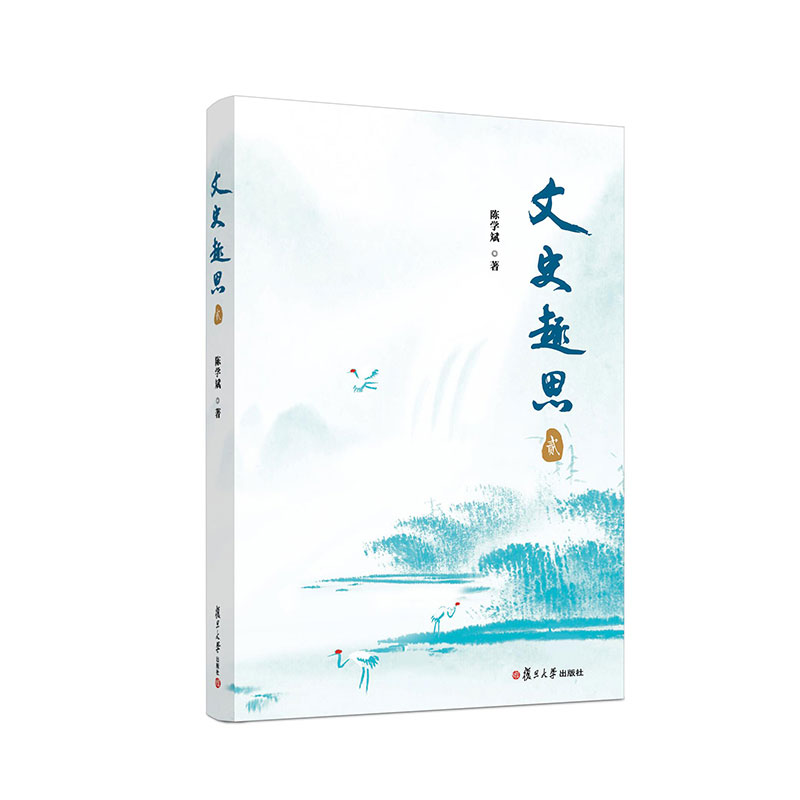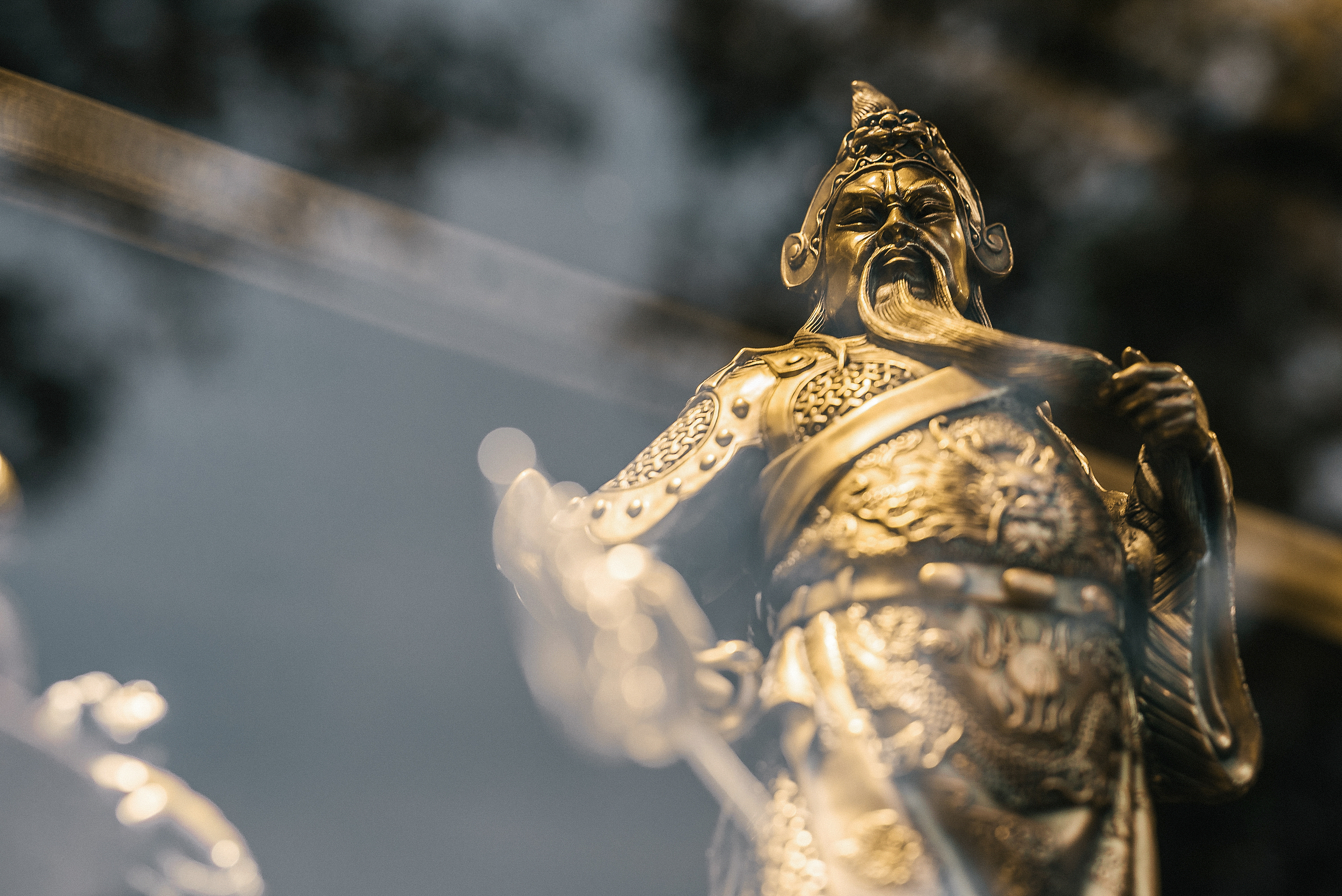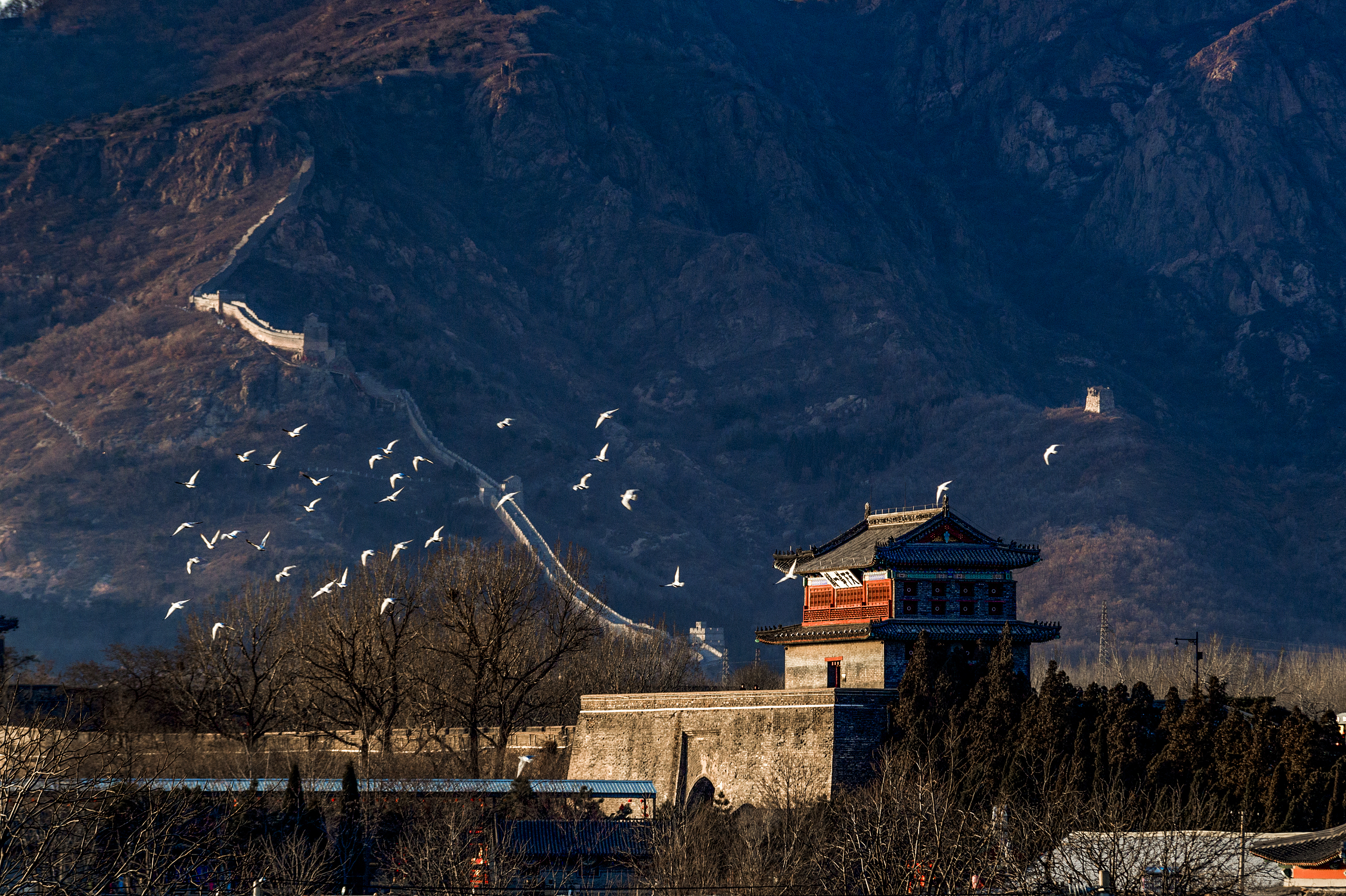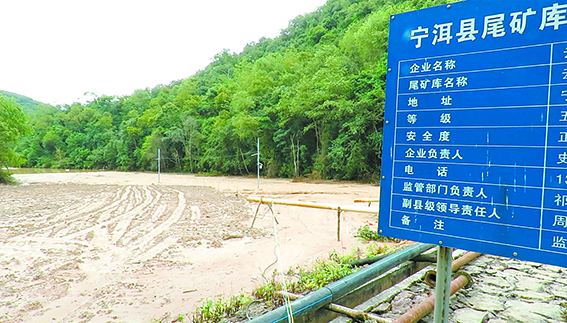Reading | Why do the mountains and rivers in China "close"?
Author:Report Time:2022.08.02

Literature and History (()
Chen Xuebin
Published by Fudan University Press
One vegetable and one meal, a cat and a dog, a branch, one leaf, what you see and hear in the bland life, and what they think of it, sometimes deafening, turbulent mood, and sometimes moisturizing and rainy. The author of this book sequels "Literature and History and Fun", still working on fertile soil, seeking cable on the peaks and mountains, looking for in the historical facts, and visiting in the hometown, remitting 15 fun articles. One person knows literature and history, and the word is interesting.
>> Select reading
Jingzhou, located in the southern part of Hubei, the middle reaches of the Yangtze River, and the hinterland of the Jianghan Plain, is a veritable historical city. "Yu scratched Kyushu, and it started with Jingzhou." Jingzhou has a history of more than 3,000 years. There are six dynasties and thirty -four emperors built here. The literati and Mo Ke left a historical imprint in Jingzhou. But to say that people are most impressed, I am afraid that it is still a period of counting the Three Kingdoms, especially around Liu Bei Zhan Jingzhou, Guan Yu guards Jingzhou and loses Jingzhou, and interprets the vivid and twists and turns. It is unforgettable.
When I visited the Three Gorges Dam from Wuhan to Yichang in the past two years, I went to Jingzhou and boarded the ancient city of Jingzhou. It was admired by the intact preservation of the ancient city, and was infected by its heavy historical and cultural. Being on the tower, it seemed to see the sword and sword of the year, and heard the drums of the year. Those heroes with ambitious Lingyun and distinctive personality, like the waves of waves and stars that are rolling in the Yangtze River, attracted people to look back at the endless looking back. During the observation, what everyone talked the most was why Guan Yu lost Jingzhou that year. If Jingzhou does not lose, can history be rewritten? Of course, history will not be rewritten, but the reason for the loss of Jingzhou can think in depth. A word that people often say are "Guan Yu's intention to lose Jingzhou", but with the talents of Guan Yu, the word "great intention" is not available. It is not difficult to see the veil of history. It is not possible for the era to fully defeat Cao Jun and restore the Han room with Guan Yu. Sun Quan's "strategy. After careful preparation, Soochow successfully raided Jingzhou, and he was caught off guard by Guan Yu. This was the real reason for Guan Yu's failure. However, Guan Yu was killed and did not harm his historical image. Instead, the tragedy of history made his loyalty and mighty reputation.
In the traditional Chinese culture, whether it is above the temple or under Caoye, the respect of Guan Yu has always been popular, especially in the Song, Ming, and Qing dynasties, the emperors of each dynasty continued to add the title of Guan Yu to the incarnation of Guan Yu as loyalty to strengthen the incarnation of loyalty to strengthen the incarnation of loyalty to strengthen the incarnation of loyalty to strengthen the incarnation of loyalty and strengthen the enhancement of the loyalty to strengthen the incarnation of loyalty and strengthen the enhancement of the loyalty. Officials' loyalty patriotic philosophy. During the Qing Dynasty, Guan Yu was chased as "the loyalty gods, Wu Lingyou, and the Emperor of the Holy Emperor". , Even deified, the people recognize him as the god of wealth. In the south gate of Jingzhou City, there was a Guandi Temple, which was built during the Ming Hongwu period. The Ming Wanli period was rebuilt. The Qing Dynasty rebuilt and expanded several times. "Ji", "Megatron Huaxia", etc., there are also rare cultural relics such as Yuqinglong Yueyue knife, red rabbit massache tank.

Shanhaiguan, Qinhuangdao City, Hebei Province (picture source: Visual China)
Guan Yu was also respected by the later generations as Guan Gong. He none among the people of Guan's name, Guan Ping, who was killed with Guan Yu, and his parent -child Guan Xing, Guan Suo and later generations Guan Sheng were mentioned from time to time. In fact, the earliest celebrities of Guan were the primitive Dragon of Xia Chaofa and the king of the two generations. Guan Longzheng is the descendants of the ancient Linglong family. According to legend, during the Emperor Shun period, the master of Yanglong, Dong Father Dong, was the emperor Shun to raise the dragon and obtained the sealing Dragon. At that time, the dragon was actually a crocodile. In order to prevent the crocodile from killing the fierce killing, it was necessary to encircle the place where the dragon raised and close the door. This is the earliest "level" meaning. Therefore, the Dragon's also called the Guan Long's, which was simplified to Guan or Long. During the assistance of Xia Xun, Guan Longxuan couldn't stand the cruelty, petting the demon Ji, unrestrained, persecution of virtuousness, and killing innocent behaviors. As a result, Guan Longzheng decided to offer a picture of the yellow map, that is, a picture of a picture of the earth public, the temple, the palace view, the Mingtang and other things. Death. Sure enough, he didn't take it for granted, but he imprisoned Guan Longyu. Later, he simply punished him, and Guan Longxuan died of burnt. Because he died for the people and bluntly died, the later generations tied him with the Shang Dynasty being cut by the king of the King and worshiped them together. During the Tang Dynasty, there were people who used the monument of Guanlong, and the inscription was engraved with "the tomb of the Xia Zhi Chen Guan Gong". During the Ming Dynasty, there was a "double loyal temple monument" for Guan Longzhang and Bigan. There is a poem praise in the Qing Dynasty: "In front of Jincaitang's Gubai, Shuangzhong left a sorrow. If you want to know the predecessor of the festival, you can read the three monuments of the Central Plains." The other source of Guan's surname is related to Yin Xi in the Guan Ling of Zhou Chaoguan. Yin Xi was called Guan Yinxi or Guan Yinling for his reasons. According to legend, when Lao Tzu went out of the customs, Guan Yinxi treated his enthusiasm and sincerely retained Lao Tzu's "Tao Te Ching". Yin. In addition, Guan's surname is derived from official positions, ethnic minorization, etc.
Guan Yu's life was a hundred battles. In "The Romance of the Three Kingdoms", he wrote his warm wine to cut Huaxiong, the three British battle Lu Bu, the Yanliang Yanwen ugly, flooded the seven troops, besieging Xiangfan, etc., all showed their courage. Still over five levels. In the cold weapon era, if a single -gun horse wants to use a few strict defense, light resistance, and obstacles, ordinary people are absolutely unimaginable, and these are amazing descriptions in the "The Romance of the Three Kingdoms". Now that when it comes to "Guan", let's take a serious study of the origin of "Guan" and the cultural and stories related to it. Guan is a meaningful word. Its original meaning is to use the top door bar to close the door, and the "Specs" is interpreted as "holding the portal with wood". Simply put, it refers to the door, which is later extended to close the door, and the closure of the door is extended to the pass, and later gave it more meaning. For example, difficulty, metaphorical difficulties that are not easy to overcome or not easy to pass; research refers to the difficulty of attacking the gate or the metaphor to break through the difficulties of science and technology; For those who owe rent and debt in the old days, they should repay their debts at the end of the year. The New Year is like passing the New Year; the tooth barrier refers to the joint between the upper and lower rows of teeth; The connection point between bone blocks, etc.; The relationship refers to the state of interaction between things and the impact of each other, and also refers to a certain connection between people or people or things, and the impact on related things; concern Pay attention, attention or care, and thoughts between people; Clear, refers to the border, border plugs or specific passage, fortress; Guanzhong refers to stopping store marketing activities or resting;
It is worth noting that, as a specific geographical concept, there are also titles related to internal, foreign, Guanzhong, Kanto, Kansai, and Kantan. In the Guan and Guanwai, the natural geographical division is based on Shanhaiguan, and it is also divided into the boundary of the administrative district that has been struck in the past. Guanzhong refers to the area of the Weihe Ventiation Plain in the northern foot of the Qinling Mountains in Shaanxi. Within four levels, it is called Guanzhong. As for Kanto and Kansai, there is a long evolution process. During the Warring States Period, when the Qin Army went out of the Weihe Plain and entered the Central Plains region, it was necessary to pass through the Hangu Pass. The Qin Kingdom in the west of Hangu Pass was usually called Kansai. For Kanto. In the Ming Dynasty, Shanhaiguan was the first level from the east of the Ming Great Wall, so the east of Shanhaiguan was called Kanto. The Qing Dynasty has always followed this title. During the Republic of China, Kanto refers to the northeast or northeast provinces.
Shanhaiguan, Qinhuangdao City, Hebei Province (picture source: Visual China)

As for the formation of ancient customs, according to research, it is related to the tax collection or stations of the state. "Zhou Li · Di Guan" records that the officials at that time had the post of "Si Guan". The Chinese Customs Museum has a "Guan" tile as a collection. It was originally a building component of the drooping part of the Gate of Hangu Gate in Han Dynasty. As an important level to go to Chang'an in the west of Luoyang in the Han Dynasty, it has witnessed the glory of the ancient Silk Road, and the word "Guan" tile was unearthed in Hanguguan, which provided strong evidence for the origin of ancient Chinese Guanzhang. After the tax collection level function, due to the frequent occurrence of the war and the continuous expansion of the scale, the nature and role of the "closing" have changed a lot, and the defense function of the customs building and closing facilities has been highlighted. During the Spring and Autumn Period and the Warring States Period, the emphasis on Guancheng and Guanzhang had become the top priority of the attention of the emperor and the commander. Various offensive and defensive facilities and tactical warfare came into being. Jiu Ji Ji Ji Ji Ji Ji rejected a contest. In ancient times, almost all large -scale wars were indispensable for the siege of the city, and to break through the customs. Focusing on the defense and competition of "Guan", many mighty, magnificent, singing and weeping historical stories are staged.
While the customs, Jianguan, guarding the customs, and research, the culture of "Guan" has also been continuously enriched and developed. For example, idioms with the word "Guan" are related to life and death, closely related, mixed pass, clenched the teeth, one language double customs, pill mud sealing, transveying the authority, retreating self -defense, unrelated macro, porch magic , I do n’t care about affection, do n’t care about myself, the tape relationship, care, closing the door to fight dogs, passing the mountains, and the pulse of the love.
Many of the ancient poems with the word "Guan" are well -known sentences, such as Li Bai's "Mingyue out of the heavenly mountains, vast clouds. Long wind tens of thousands of miles, blowing Yumen Pass", Wang Changling's "Qin Shi Mingyue Han Shi Pass, 10,000 miles of Long March people Not repaid. But let Longcheng fly to the mountains, and do not teach Huma Du Yin Mountain. "Wang Wei's" Weicheng faces the rain and light dust, and the guest shelves green willows. Wang Zhizheng's "Yellow River in the distance, a lonely city in the distance, a lonely city. How can the flute blame the willow, the spring breeze does not stop Yumen Pass" and so on. Su Shi has a word that describes him and his brother Su Zhe for a long time and appreciate the Mid -Autumn Festival and the Mid -Autumn Festival. Where can the Mingyue look at it next year? "This great Wenhao wrote many lyrics in the" Yangguanqu "word cards. The real name of "Yangguanqu" is "Weicheng Qu", which is monotonous twenty -eight characters. "Yang Guan Qu", as the name of the piano song, is "Yangguan Sanlie". This is one of the top ten Guqin songs and a masterpiece of Guqin art. Lu You has a seven -character poem "Guan Shanyue", three levels of poem, four sentences for each level. Among them, the first level is: "Fifteen years of He Rongyu, the generals will not fight. Zhu Men Shen Shen Yan danced and danced, and the horses were fatal." Steam. "Guan Shanyue" was originally the name of the Han Dynasty Lefang's horizontal blowing song. The song made by parting was sad. Lu You used the old questions of Gule Prefecture to make content and form of innovation. There are many culture and stories of "Guan". In order to understand the symbols and meanings of "Guan" more deeper and thoroughly, you may wish to extend and expand the relevant content from different perspectives and different meanings. The mountain side becomes a peak, which is different from the distance. "
Author: Chen Xuebin
Edit: Kim Jiuchao
Editor in charge: Zhu Zilong
- END -
Ning'er County, Pu'er City, conducting investigation of environmental pollution related to heavy metal mines

In order to fight against pollution prevention and prevention, strictly prevent th...
Transaction is changing!Chuanrun Co., Ltd. rose 20.0%in the nearly 3 trading days, without uninvored major matters

Every time AI News, Sichuan Run (SZ 002272, closing price: 6.6 yuan) issued an ann...